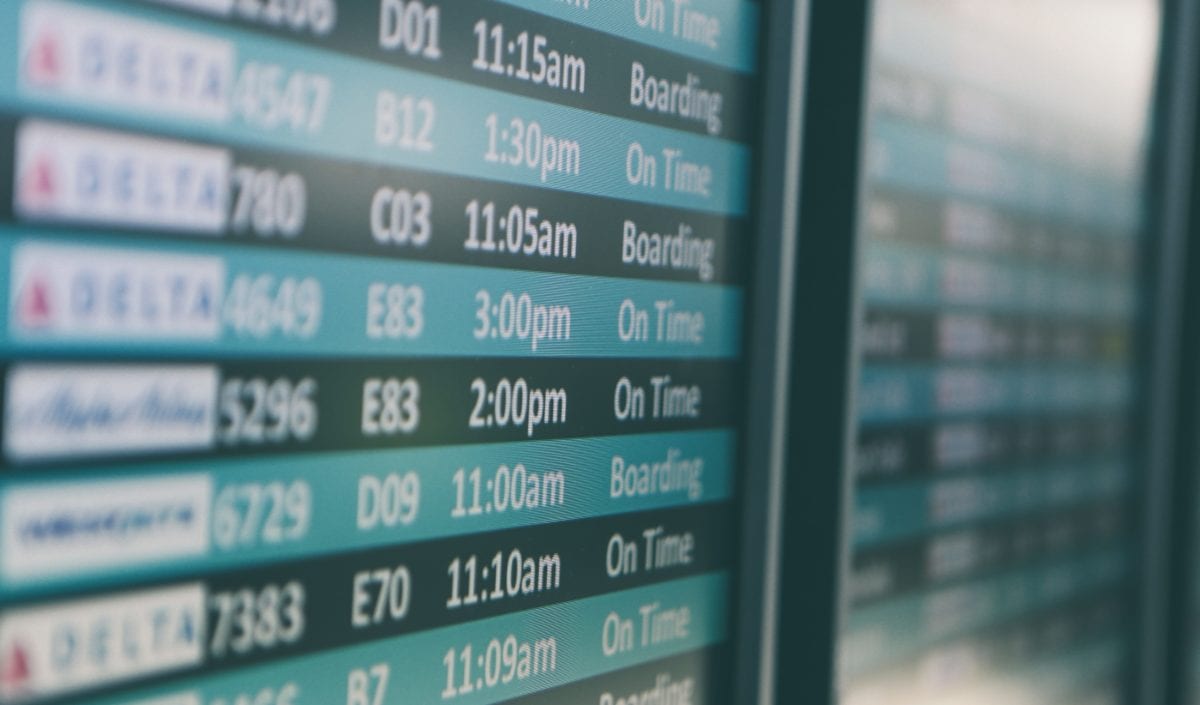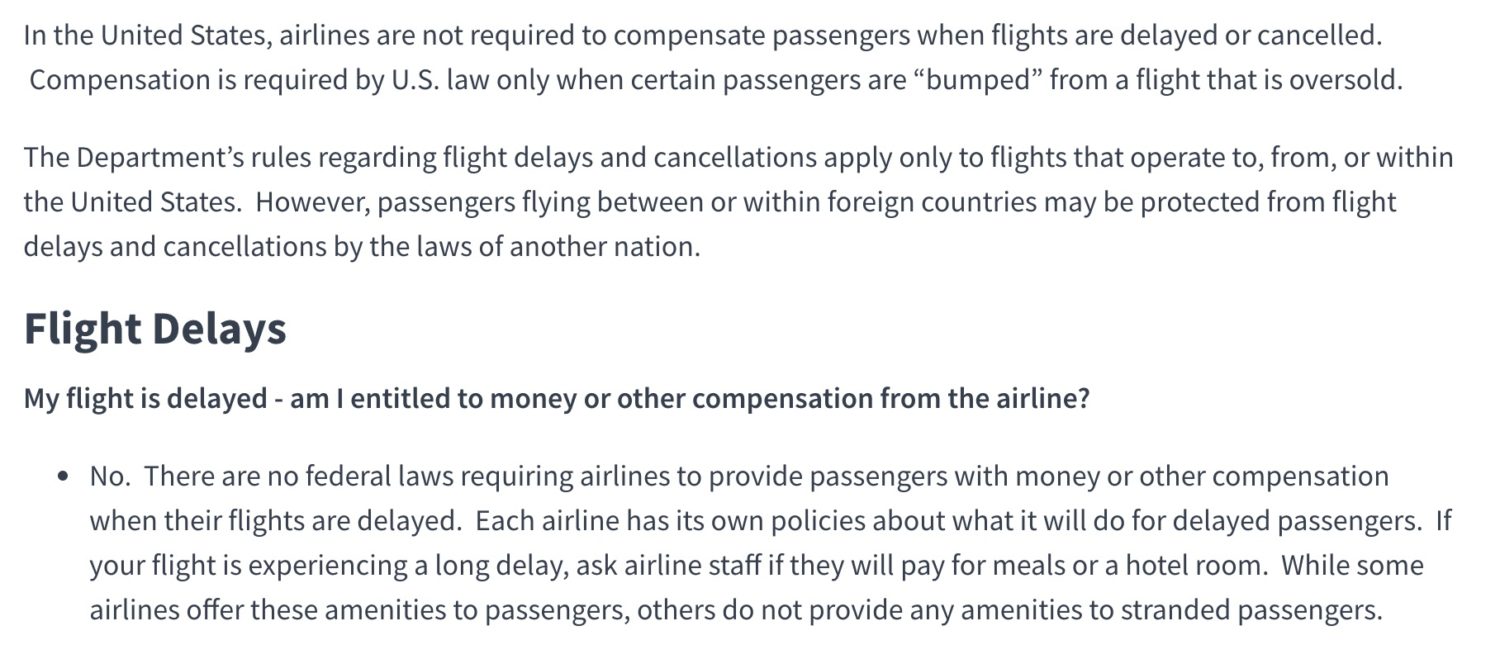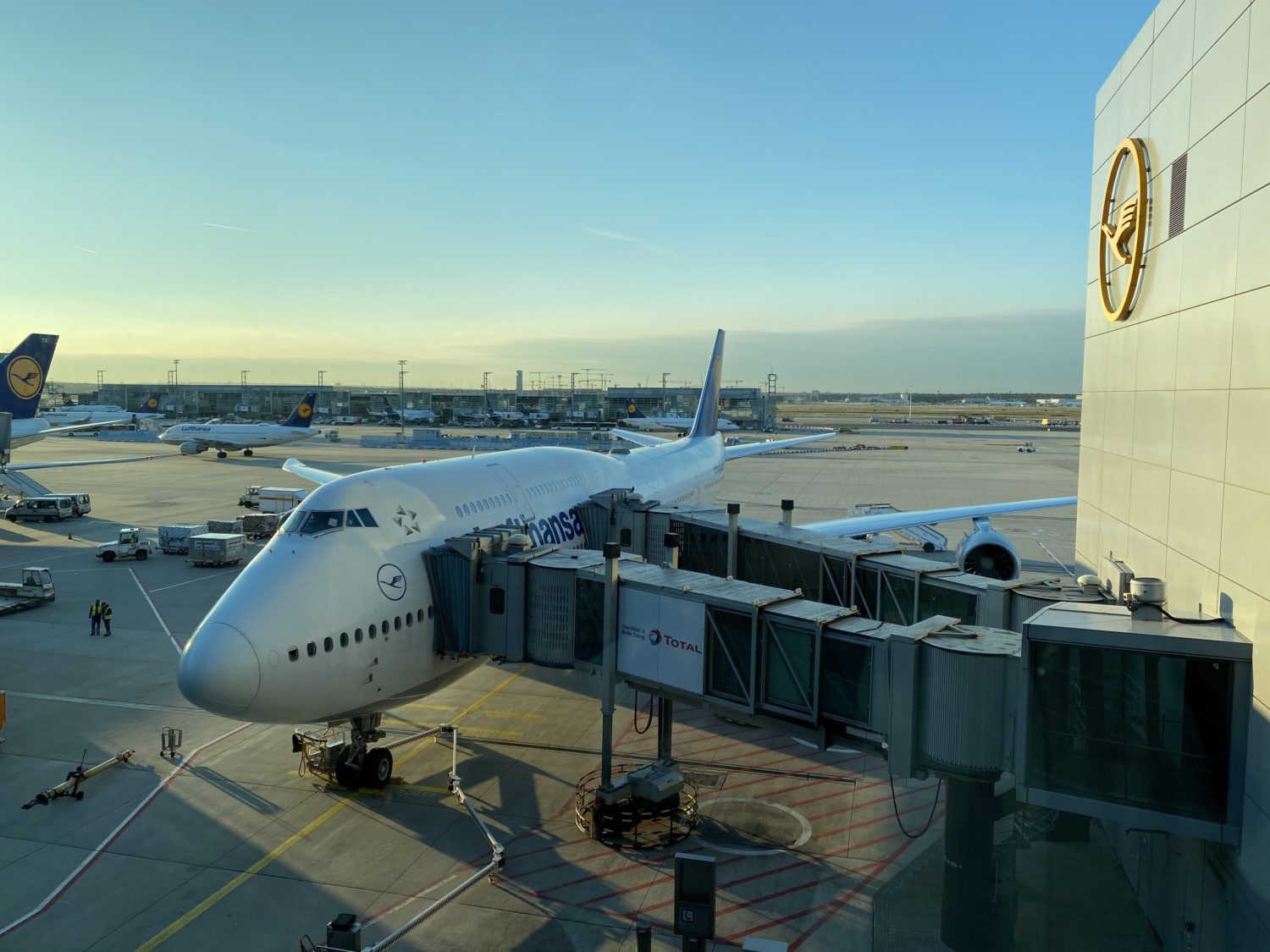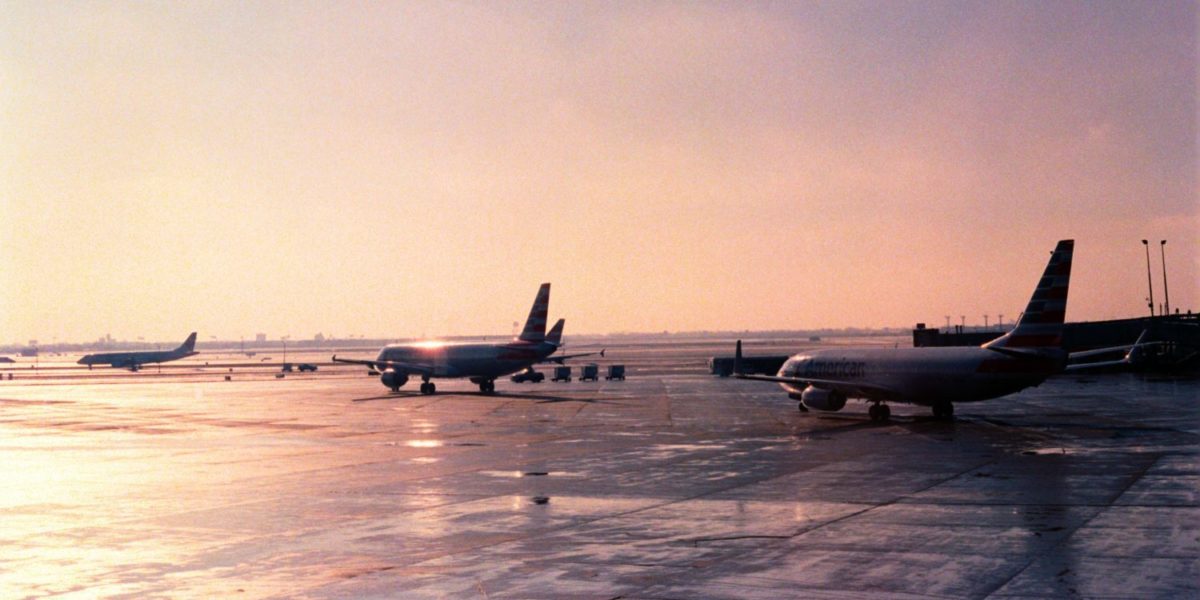Editor's note: We originally published this opinion piece on Dec. 29, 2021. A year later, nothing has changed even as another major airline is canceling 2,500-plus flights a day. That's why we're republishing this story, renewing our call for U.S. officials to step up and give travelers greater rights and protections.
Days after a winter storm passed, Southwest Airlines is in the midst of an unprecedented meltdown, canceling thousands of flights a day and leaving millions of Americans stranded and scrambling to salvage travel plans on their own dime. But this is nothing new: U.S. airlines big and small have canceled and delayed flights by the thousands again and again. From Delta this past summer to Spirit Airlines in summer 2021 and every airline in between, almost every major carrier has had a major operational failure in the last two years.
The writing is on the wall: As airlines continue struggling to recover from the pandemic, these mass cancellations are bound to keep happening. And aside from a public relations hit and some refunded ticket sales, airlines don't pay the price for repeatedly failing customers. Everyday Americans do.
In U.S. law, travelers have shockingly few rights or protections when buying plane tickets. There's no legal requirement for airlines to compensate travelers for these massive disruptions – or even to feed customers or put them up in a hotel when they get stranded overnight. Travelers are entitled to be placed on the next available flight (be it hours or days away) or request a refund and try to rebook their trip. That's really the only power we've got.
Even after giving airlines tens of billions of dollars in taxpayer subsidies to survive the pandemic, the federal government has left it up to the airlines to decide how to do right by consumers. Until there are real penalties for these massive failures, airlines will continue overpromising and underdelivering. That's what they've been doing for years – it's part of the reason these cancellations keep piling up.
Enough is enough.
Today, we at Thrifty Traveler are once again calling on officials in Congress and the Biden administration to give travelers more power by requiring airlines to compensate passengers when they significantly delay or cancel flights for reasons other than weather. Similar requirements have been in place throughout Europe for nearly two decades and were recently introduced in Canada.
“Every time an airline cancels hundreds of flights in a day, thousands of Americans are left stranded or scrambling to salvage their travel plans with little guidance or assistance from the airline itself. That's unacceptable,” Thrifty Traveler CEO and Founder Jared Kamrowski said. “Requiring airlines to compensate customers when they delay or cancel flights would give travelers more control and power. But most importantly, it would help keep airlines accountable, limiting the mass disruptions we've seen over the last few years.”

To be fair, running an airline is a hard business even in the best conditions. Getting hundreds of planes on and off the ground on-time is incredibly complex, where a small storm, software outage, or mechanics' strike can result in days of scheduling issues. A massive storm like the snow and brutal cold that swept across the country last week is another animal entirely, and airlines shouldn't be held responsible for bad weather.
But that storm is long gone now. With clear skies across much of the country for the last several days, Southwest can no longer blame weather for 2,500-plus canceled flights a day.
There's no question the pandemic has made things harder. After downsizing through early retirements and exit packages, travel is back to near 2019 levels – and airlines can't grow fast enough. But they've stretched themselves too thin, packing schedules and passengers as tight as possible to make up for years of lost revenue … without leaving themselves enough wiggle room to recover when things go seriously wrong.
That's the common thread in almost every mass airline cancellation in the last year or two. It's especially painful recently, as cancellations have affected millions of Americans at a time when many are flying to join family and friends over the holidays – perhaps for the first time in years.
When things fall apart, what little comforts passengers can find from their airlines are in a “contract of carriage,” 50-plus page documents that vary from airline to airline. And the airlines themselves write these contracts, using words like “may” instead of “must” when it comes to offering hotel nights or placing affected customers on another airline to get them to their destination.

We need to do better by consumers and keep airlines accountable. The U.S. won't have to look far for how they could change things…
A Model to Do Right By Consumers
It'll come as a surprise to many Americans, but for European travelers, getting money from the airline after a delay or cancellation is old hat. It's been a part of their travel lives for nearly two decades.
Commonly referred to simply as EU261, this regulation passed by the European Commission in 2004 offers a broad set of passenger protections when things go wrong in the skies – far, far more than what's available here in the U.S. And that includes guaranteed compensation when the airline delays or cancels your flight, plus other rights like meals, hotel stays for overnight delays, and more.
Just how much you can get depends on the length of your flight – and the length of the delay or cancellation. Payouts range from 125 euro (about $133 USD) for a delay of less than two hours on a flight under 1,500 kilometers (932 miles) to as much as 600 euro ($637 USD) on a delay of four-plus hours or cancellation of a flight of 3,500 kilometers (2,174 miles) or longer.
That's enshrined in the law. No matter what else the airline does to help, they owe passengers that money. It also applies to foreign airlines departing from or flying within the European Union.

As expected, major European airlines fought against the measure as it was being proposed. And while Europe has seen its fair share of disruptions in the airline industry over the last year, it's nowhere close to two-plus years of mass delays and cancellations here in the U.S. – and at least travelers are compensated for their troubles.
This has been going on for days, weeks, months, and years now in the U.S., over and over again. The disruptions have touched practically every domestic carrier. This is bigger than weather and the pandemic.
And Europe isn't alone, either. Canada implemented its own “Air Passenger Protection Regulations” in 2019 that also guarantee compensation in the event of lengthy delays. Those payouts range from $400 CAD ($296 USD) for delays of three to six hours to $1000 CAD ($740 USD) for delays of nine or more hours – though smaller airlines can pay less.
Where Things Stand in the US
There have been several efforts over the years to do what Europe and Canada have done for consumers. They just haven't gotten anywhere.
Members of Congress have introduced bills that would create a broad set of passenger protections, including limiting add-on fees, ensuring prompt refunds, and guaranteeing compensation for disruptions. And just late last year, the U.S. Senate hauled airline CEOs into Congress to explain why they've canceled so many flights after bailouts that were designed to keep the airlines running at full strength through the pandemic. There were few satisfactory answers – and even fewer immediate solutions offered.
The Airline Passengers' Bill of Rights, spearheaded by Connecticut Democratic Sen. Richard Blumenthal, would go even farther than the laws in Europe and Canada. It would require airlines to refund the full cost of a ticket plus give passengers $1,350 when delaying flights. After failing to gain traction in previous years, Blumenthal and several Democratic colleagues reintroduced the bill last year.

“Almost everyone who has flown is familiar with how much of a hassle air travel can be, and COVID-19 has only amplified many of the challenges,” Sen. Ron Wyden, an Oregon Democrat, said in a statement about the bill last year. “It’s time for a new ‘Airline Passengers’'Bill of Rights and to stand up for the rights of all air passengers by ensuring ironclad consumer protections for air travel.”
But there's another possible avenue for action: The Department of Transportation and Secretary Pete Buttigieg. Advocacy organizations have urged Buttigieg to act unilaterally and create some additional passenger protections, as past department heads have done with security measures after the Sept. 11 attacks or to counter lengthy tarmac delays.
Buttigieg is clearly paying attention. He spearheaded a new customer rights dashboard and tried to get tough on airlines over the summer of 2022 after several mass delays and cancellations … with mixed results. With Southwest melting down after the holidays, the department said Monday it would “examine whether cancellations were controllable and if Southwest is complying with its customer service plan.” Buttigieg himself said Monday he was “tracking closely.”
From the halls of Congress to the White House, airlines wield tremendous power to fight any proposed changes or accountability.
Despite an avalanche of complaints from passengers seeking refunds that started when the pandemic first upended travel, only one U.S. airline (Frontier) has been fined or penalized for denying customers their money back, the one true right we have. Air Canada – which resisted giving out those refunds for more than a year – was also penalized … but a proposed $25.5 million fine was watered down to just a $2 million penalty after the department struck an agreement with the airline.
Bottom Line
Airlines will fight this. They’ve done the best they can through an almost impossibly hard three years, they'll say. After suffering billions in losses since 2020, being forced to compensate passengers would make matters worse.
That may all be true. But the additional costs to airlines to do right by passengers would pale in comparison to tens of billions of dollars in subsidies we taxpayers have given those same airlines over the last two years.
Here's the most important part: It’s all in the airlines’ hands. They could be responsible and measured, selling flights with enough wiggle room to recover when things go wrong and uphold the commitments they’ve made to customers. If they do that, they won’t have to pay their customers a dime in additional compensation.
But if they go too far or fail and continue to leave their paying customers stressed and stranded, it’s time for the airlines to be held accountable.




I long for masking requirements to be reinstated on all public transport. The unseemly ignorance of a halitosis comment in the context of public safety, highlights that writer’s ignorance and port upbringing. THEY/ONE RUDE PERSON (Probably of the sort who pulls their mask down under their nose, ever chance they thought they could get away with it. Though the ignorance is right there, with people who peel out their tires, thinking this donut is impressive, believe me dude, we know you are compensating for a shortage somewhere else. Here’s hoping you will mature, develop an executive vortex ( if you don’t smoke pot…then you may or may not ever, finish your brain development). Taking care if those who serve us on a plane, and other passengers such in that small airspace with your Omicron Breath, is a fatal risk for many (a grandparent, a baby, not even on this flight with people like you, who SEEN to feel that their own selfish preferences are more important than public health.
Sadly, you are wrong about Amtrak. They promise reimbursement, witnessed repeatedly, for delays as long as two unexpected hotel nights in a major metropolitan area, in no notice. And they lie. At the highest levels of Corporate Customer Service, they lie (corporate culture trickles down from the top. Any seasoned adult professional, knows this. Amtrak COULD have spared an entire trainload of people from packing up and checking out of their hotels, hD they only bothered to perform routine tests to ensure their Emergency Alert System was functional, leaving a few extra hours to arrange a known ride on that route, hD they bothered to care. But they don’t. They do not deserve anything further than stricter oversight, compliance reporting, and JUST enough financial help to fix track know to have shearing issues, or very close to it.
Due to a known, intermediated obstacle, which went unmarked, and intermediated on that same ttain, after already hurting one passenger on that same train, this failure to pay attention and be responsible and professional, caused a slow twisting fall go a disabled senior, and injuries that did require x-rays and long-term care (the fingerprint bruises from this passengers who tried to catch the woman from the fully extended fall through a fake wall (where one braced, as trains do jostle of course, at times). Amtrak should be cut back. They have run. high-speed train off its track and onto an interstate, killing people, using a design shape you wouldn’t expect an electric Brio train engine to stay on a track with that tight of a corner, and people are dead. Further, no matter what you are told over the phone about a baggage car to check luggage that cannot be watched, they lie about that too. Never EXPECT you will get what you are told by Amtrak. If you have a few weeks of all you extra timr, you MAY eventually get a decent Rep who doesn’t lie about terms, and their name. It:s a pathetic operation in the West.
One last note about transportation knowledge,. yrs girls DO see your peel-outs, and donuts spun by your car, but they buy tires too. All that sins you is a Capitol “L” across the forehead, a certified since stamp. If you need/want to practice control through a skid or a donut, go to an ice snowy (sports arena or highschool parking lot, on a weekend). It’s a good skill to know, in an emergency, bit not at the large expense of new tires sooner. All that days is “dumb”.
Best wishes on controlling your anger, and taking in these helpful tidbits as the gems of info they are. Amtrak…..haaha. Perhaps if it were nationalized (taken over by the government), people wouldn’t get stranded in the dead of Winter in Oregon, Cafe Car ultimately devoid of food. And yet, there was no mission of Mercy to go to the very nearby visible walkable town, to support passengers with medical conditions, who after such a long time were out if their own snacks too. They put eay too many lives on the lone out west, and treat people (at their highest levels), with utter disregard, and no reimbursement for 2 people, meals, hotel, pet boarding, and then oh yes, they stopped it off with a dogpoop cherry, and sent all the TWICE RE-PACKED AND TAPED DIDABLED EQUIPMENT, TO ANOTHER STATE. Amtrak needs tighter regulations, whole new mgmt with accountability and oversight, and not a dime more than necessary for track maintenance (which likely also goes unchecked, or done slovenly. Best wishes to you Amtrak travellers. Even after two years of efforts to have them make good on the reimbursements, they sound up only offering a voucher for one, of the two passengers. Our railways need new mgmt and better oversight. Oh! And Cust Svc, after two years, had not processed the Conductor statement, nor the required federal paperwork for injured passengers, including the witness statements and phone numbers. They will grind you to a nub (it’s equivalent to mentioning the words Cust Svc, and Citibank, in the same sentence without snickering (in financial professional circles). It’s all fine, until they need to fix something. That’s why they have to drop their drawers to get new bankcard customers, and offer longest 0℅ balance transfer offers. Brst wishes on your travels, if you ever use Citibank or Wells Fargo bankcard services, where even internal employees in that department, acknowledge, diplomatically and surreptitiously, that “you’re preaching to the choir”.
Best wishes on happy travels, without any of the scenarios above.
And None of this credit for future use. Need to just pay up now. Money talks. Cash is king.
I had my sons Southwest flight cancelled for 12/28/22 and they can’t get him a flight until 1/2/23 (that’s 5 days later and he’s paying a couple a hundred a day to board his 2 dogs). If he rebooks a flight for 1/2 and then cancels it, do you know if he will get the amount he originally paid for flight on 12/28 or the amount of flight he rebooked on 1/2. Just trying to recover a little something from Southwest since he is now renting a car to drive back to Denver.
The sheeple are everywhere, mask? Dont work, jabs? are killing and disabiling people. 2 months testing a vaccine haha normally yakes 16-18 months by then the bug is gone. With internet and thousands of doctors and scientist revealing the truth why are you still thinking a mask works. Maybe for your bad breath
Airlines get massive subsidies- think TSA or FAA or airports. Only highway or road travelers get more. It is difficult to feel sorry for an industry that even buys aircraft while in bankruptcy when you see Amtrak struggling to buy new equipment to replace 40+ year old cars. I do agree our federal tax dollars are needed to subsidize mass transit like planes and trains. Also agree scheduling and staffing are a challenge that is off the charts. However, airline companies keep baggage fees with all these canceled flights and need to have aircraft in reserve including crew for times like these.
I think the time has also come for airlines to only fly vaccinated people and take bold steps like this to protect the traveling public and their employees. Unvaccinated passengers (pro choice) could pay higher prices or not get a discount for flying in return for keeping the airline flying. In Mpls the Guthrie opened with sell out crowds because it required vaccination proof, ticket, and wearing masks for their shows. It works in close quarters like aircraft and theaters- hard to ignore that during a pandemic.
I am shocked that terminals, TSA, or airlines do not do temperature screening at a minimum. Cambria has a system that scans employees rapidly as they enter the building. Airlines only require masks because the feds demanded it?
Vaccine mandates for domestic travel and for international travel starting from the United States.
If my flight gets cancelled due to a “mechanical” issue, it’s the airlines responsibility to make accommodations for me. Weather is one thing, but if it’s a problem with the airline, that’s on them.
As far as your awaiting results or COVID positive, I partially agree. COVID positive, and you fly, that person is an a-hole. Awaiting test results…should be not flying.
I had 117 flights last year, 154 this year. Had to wear a mask, but not while I was eating/drinking…because the Rona knows not to attack at that point, right?!
As far as your 18 hours with 9 hours in between, that is false.
“Consistent with section 335(a) of the FAARA 2018, the FAA plans to amend part 121 regulations that apply to flight attendants who are scheduled for a duty period of 14 hours or less. Section 335(a) requires the regulations reflect that such flight attendants have a scheduled rest period of at least 10 consecutive hours that cannot be reduced under any circumstances.”
If you’re working 18 hour days, your airline is in violation of federal laws
You have no idea what you’re talking about. And as a flight attendant, I take offense to this whole article.
How about we fine people who are getting on airplanes awaiting covid tests or are positive?! (Which has happened more times than can be counted, at my airline alone.) You’ve now caused 3-5 flight attendants to be out of work for 10 days and pay protected. That can be upwards of 40 flight affected by just these flight attendants. Everyone is so understaffed. We can legally work 6 days straight, up to 18 hrs a day with only 9 hrs off between flights after that day. Your 9 hrs starts the minute that door opens from your last flight; clearly you’re not in bed at that time, nor are we getting paid. You’re asking airlines to continue this mistreatment of inflight crews. You’re also just asking for airlines to raise prices to now cover these fees. Yes, it’s annoying to have a flight cancellation but you can’t expect airlines to rebound as quickly as people stopped flying. Our training is 4 weeks, other airlines are 8 weeks. They can only train so many people at a time, and it’s governed by the FAA, so not everyone passes. Airlines can’t train and hire fast enough. Flying isn’t a right. Buy some insurance or drive or get in a bus! Are you going to sue NYC transit now that they’ve closed certain subway lines due to staffing?! Give me a break!
Not surprised your name is Karyn.
First off, mask mandates did nothing. Second, coronavirus is simply not that dangerous. Third, I’ve had dozens of cancelations and doors shut in my face by counter agents when I’ve been standing in line (Thanks Alaska!).
ONLY airlines treat people this way. Go Google “(name of airline) sucks”. There are THOUSANDS of consumer complaints.
We are SICK OF BEING TREATED LIKE THIS! How many times did you make that obnoxious threat to throw someone permanently off your airline for failure to wear an unnecessary medical appliance, Karyn? How many times did you parrot a seven minute long advertisement for a credit card because your company wanted to squeeze a few more bucks out of us?
Currently stuck in the airport AGAIN because the largest US carrier randomly canceled my flight and “We are working to rebook you.”
Yeah. Sure you are.
Shut up, Karyn
PS: Your crappy attitude towards the people who pay your salaries is indicative of the airline industry as a whole, and EXACTLY what is wrong with the entire system.